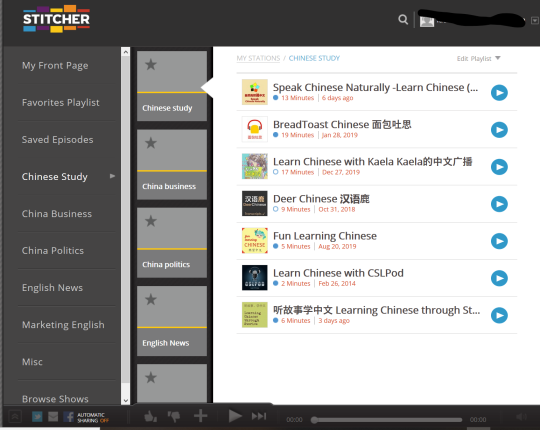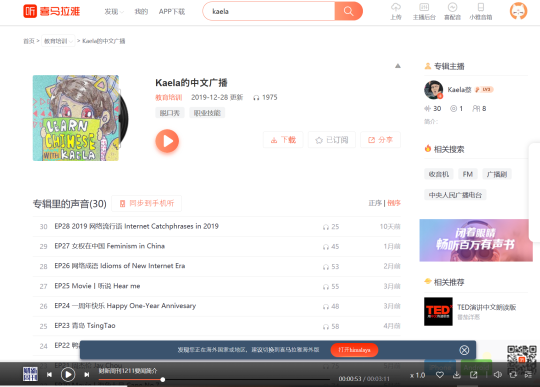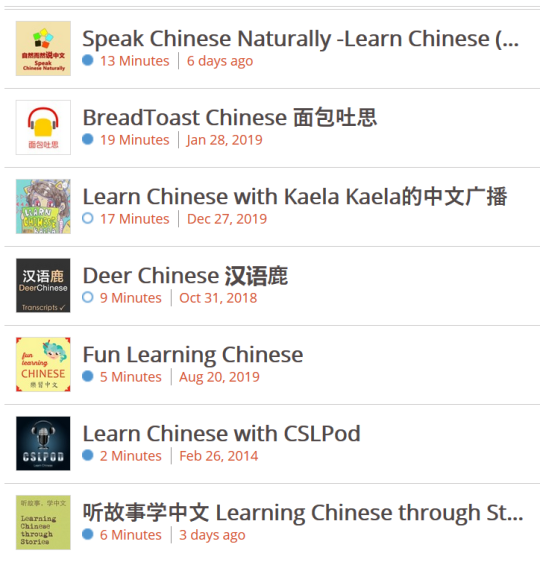#stydyspo
Podcasts are simply the best way to squeeze in study time into busy schedules. Doing any sport, doing groceries, walking to/from school and work, extra time can be squeezed in (I always think back to the analogy with the stones, pebbles, sand and water in a cup, remember that post by Hacking Chinese?).
Below is some Intermediate to advanced appropriate listening material. If you have any suggestions don’t hesitate to contact me!
By the way, I am thinking of creating an Instagram account, is that anything you are interested in? Let me know!!
Podcast software/Apps:
Stitcher, Spotify and Ximalaya all have mobile apps and desktop versions for easy syncing.



Podcast Shows:
Ximalaya Podcasts:
- 青春逗[this show is presented by two 海归 (Chinese returnees, i.e. two Chinese who have lived abroad and come back to China), therefore they sometimes mix English words within the podcast. It is a contempary topic discussion podcast, spoken in natural language between the two presenters and sometimes a third guest] https://www.ximalaya.com/shishang/18796952/
- Linda讲故事 [naturally spoken language, one person retelling a story, natural and unscripted] https://www.ximalaya.com/qinggan/29392148/
- 健康生活100问 [has a question about nutrition and it answers the question in 3-5 minute short episodes, for example ‘is MSG really bad for health?’, 'which is healthier, cow milk or soy milk?’] https://www.ximalaya.com/jiankang/18734760/
- 故事FM [each episode has a different person come to tell their story about some kind of topic, such as being abused, quitting a 'top school’, and other stories that tell lives of very ordinary people but presents a picture of lives of ordinary chinese people with a story to tell. It’s also spoken in natural, unscripted language with a host] https://www.ximalaya.com/toutiao/7878702/
- 失眠小姐[Short 3-5 minute 'life advice’ to soft background music] https://www.ximalaya.com/qinggan/292190/
- 唐诗三百首 [Learn the 300 Tang Poems] https://www.ximalaya.com/ertong/16479532/
- Kaela的中文广播 Learn Chinese with Kaela [a naturally spoken podcast presented by Kaela, transcripts for the show found at https://gaerdan.wordpress.com/ https://www.ximalaya.com/jiaoyu/16634873/
Stitcher Podcasts:
Simply search the below podcasts in your podcast app

Misc Podcast Websites:
These podcasts you can access through the podcast website (the ones with *s are ones I have used and are very good, its worth spending time on the website, you can download the MP3s to your phone)
o https://www.slow-chinese.com/podcast/*
o http://justlearnchinese.com/mini-novels/
o https://mandarinbean.com/category/advanced/
o http://justlearnchinese.com/category/chinese-short-stories/
Do you have anymore? Please share in the comments!
#4# hacks for vocabulary accumulation
In Chinese.
Recording yourself saying pleco words + listening often
Better yet, get Chinese friend to help you, record yourself or friend saying the Chinese word then English, listen to the recording when on the bus, brushing your teeth and it’s an easy way to memorise vocabulary without having to sit down and write them. Its best used in conjunction with studying the characters as well, however, so you learn how to write and recognise them. I usually do this by playing pleco when I have 2 or 3 minutes here and there. Throughout the way it adds up!
Learn the joint words together
For example 采取 + 措施 / 掩盖 + 错误. It not only helps you remember the word better but also when to use it with which words. For example 掩盖错误 translates to cover up ones mistakes. But in chinese there are many words that can translate to cover up (隐藏 遮盖 etc.) and may be a little confusing as to which one to use. If you learn them together it is easier to use the correct pairing.
Use pleco to record phrases
Pleco is the best vocabulary app. You can also add your own words or phrases if they are not in the dictionary. I often use this feature to help me remember certain phrases
Listen more !!
Listening improves your vocabulary by reinforcing the new words in two ways. Firstly you encounter the word again and helps it become reinforced in your long term memory. Secondly it uses the word in a context that helps you remember the situation in which to use at, and not simply the direct translation. Therefore it can help it become part your your active vocabulary.

I have a list of listening resources On my resources page. I will make an updated comprehensive list for intermediate-advanced learners soon. Stay tuned.
Do you have any other tips? Share them below!
